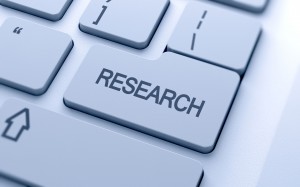
Online Librarian at American Public University System
Chances are, when you’ve been assigned a research paper, your first idea is that you’ll to do a quick search on Google. Perhaps you’ve been surprised when your instructor says that Googling for resources is not allowed. You might then ask, “Well, why not?”
Like most people, I’ll use Google when I am looking for information. When I tell students this, they are often surprised. “But you’re a librarian,” they say, “does that make it okay then?” My response is, “It’s not a matter of what’s okay; it’s what works best for the kind of question I have or the kind of information I need in order to answer it.” Often, especially with regard to college papers, Google is not the best place to go. Here’s why.
The results you get from Google are based on three things:
- The frequency and location of keywords within the Web page
- How long the Web page has existed
- The number of other Web pages that link to the page in question [1]
The last item is key. Basically, Google ranks a search based on popularity. Popular doesn’t automatically mean bad, or incorrect, but there is a strong possibility that the information retrieved is not correct, or it is biased, or is from an unreliable source. [2] And it is not just Google that we need to be worried about. The whole Internet, the open parts of it and the so-called deep web parts of it, all require that we understand what’s happening on many levels.
You’ve probably heard the term information literacy. And, since you mostly likely use a smartphone, an iPad, or an eReader, or play computer games, you probably think of yourself as being information literate, a true citizen of the information age! But, having all of these electronic technologies doesn’t always mean we know how to use them effectively.
Here’s where the whole notion of Web information literacy comes into play. What we really need to be is multi-level literate. That is, we need to simultaneously be computer literate, information technology literate, information literate, and media literate. There are reasons this is so important, especially when you are a student.
Computer Literacy
Being computer literate means you have a working understanding of the electronic technology we use all the time. You can upload files, use a Web browser, operate a laptop or iPad, use basic software like Microsoft Word pretty well, and know what all the cables and attachments are for.
Information Technology Literacy
Information technology literacy means you understand the “underlying concepts of technology and [apply] problem-solving and critical thinking to using technology.”[3] This goes beyond knowing how to clear your cache or block cookies, or cut and paste a graphic into a report. Digital culture guru Clifford Lynch describes it as “understanding how technology, systems, and infrastructures work.” [4] That is, you don’t just know what all this cool technology is but why it is and how it works in our local and global societies.
Information Literacy
The information literate person has a special set of super powers! They can recognize when they have an information need and they possess the practical thinking abilities needed to locate the required resources This person can evaluate the quality of materials they’ve found, and is able to apply it effectively to answering their question or solving their problem. [3]
Media Literacy
Media literacy takes you to the mountaintop, in a sense. It encompasses knowing what the technology is, why it is, and how to use it. According to The Center for Social Media, media literacy extends the “the capacity to access, analyze, [and] evaluate,” into being able to “communicate[s] messages in a wide variety of forms.” [5]
Don’t panic if you don’t possess high- level competency in all four categories right off. It takes time to learn them and how you learn them often depends on your individual style of learning and thinking. What your professors are looking for is the student who is aware of all these levels of literacy and is working at incorporating them into their academic lives. Being Web information literate means you are skilled, actively learning, and curious about the details as well as the big picture of this so-called “Information Age.” After all, this is what being a student is all about.
Resources:
[1] Strickland, Jonathan. “How Google Works” 20 December 2006. HowStuffWorks.com. <http://computer.howstuffworks.com/internet/basics/google.htm> 17 May 2013.
[2] Harriett Green, English and Digital Humanities Librarian at the University Library of the University of Illinois at Urbana Champaign, has a neat, short evaluation on “Why not just use Google or Wikipedia? “ at this page on the UIUC Library website: <http://preview.tinyurl.com/cdt7zbf>. 17 May 2013.
[3] Association of College and Research Libraries. .Information literacy competency standards for higher education. 2000. <http://www.ala.org/ala/mgrps/divs/acrl/standards/standards.pdf> 17 May 2013.
[4] Lynch, Clifford. “Information Literacy and Information Technology Literacy: New. Components in the Curriculum for a Digital Culture.” 21 February 1998. <http://old.cni.org/staff/cliffpubs/info_and_it_literacy.pdf> 17 May 2013.
[5] Center for Social Media. School of Communication, American University. Washington, DC. 2008. The Code of Best Practices in Fair Use for Media Literacy Education. <http://www.centerforsocialmedia.org/resources/publications/code_for_media_literacy_education/> 17 May 2013.
About the Author:
Online Librarian Dr. Judith Jablonski joined APUS with more than 25 years of experience in special and academic library work; metadata management, and higher education instruction in the Social Sciences and the Humanities. She serves as subject specialist for the Arts and Humanities programs, specifically as the liaison for the Psychology Program. Outside of APUS, Dr. Jablonski lends her skills to the Milwaukee Veterans Acupuncture Military Stress Relief Project, serving as webmaster as well as the marketing and communications lead.
Comments are closed.